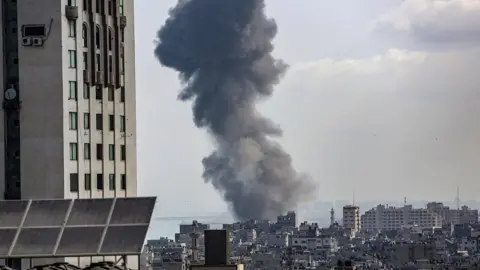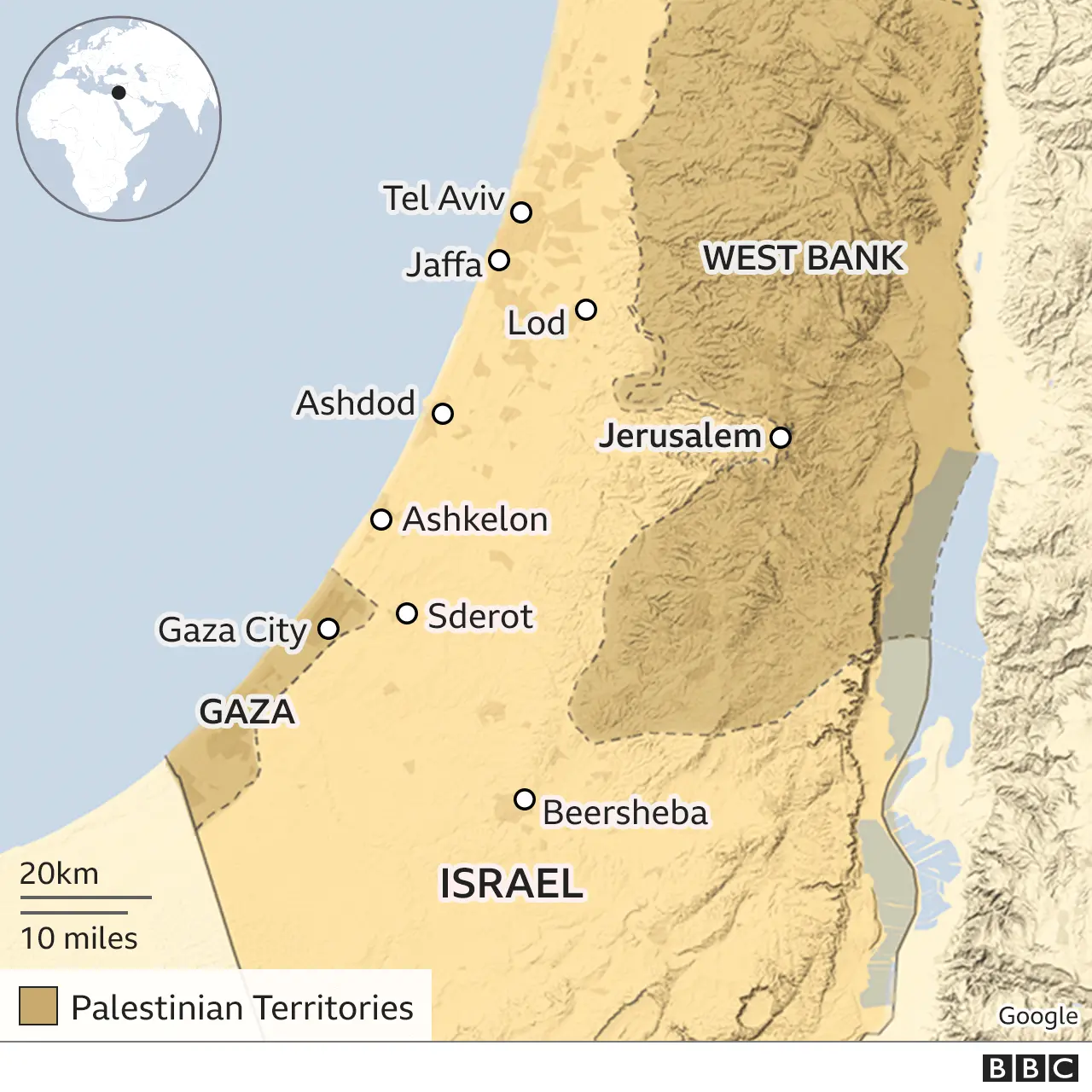Israel-Gaza: Israel and Hamas 'close to ceasefire deal'
 EPA
EPAIsrael and Hamas are close to a ceasefire deal to end fighting, reports say.
Sources familiar with truce talks have told the BBC that Israel has informed Egyptian mediators it will agree to end military action.
There has been no official confirmation of this from Israel where PM Benjamin Netanyahu is meeting his security cabinet.
Both sides are facing international pressure to end hostilities.
The Israeli security cabinet will vote on a proposed unilateral ceasefire that would take effect within 24 hours, Israel's public broadcaster Kan reported.
Earlier a senior Hamas official said he expected a ceasefire deal with Israel in "a day or two", while Mr Netanyahu on Wednesday vowed to continue the military operation until "calm and security are restored".
On Thursday more than 100 Israeli air strikes targeted Hamas infrastructure in the north of Gaza. Hamas retaliated with rocket fire.
Fighting began in Gaza on 10 May after weeks of rising Israeli-Palestinian tension in occupied East Jerusalem that culminated in clashes at a holy site revered by both Muslims and Jews. Hamas began firing rockets after warning Israel to withdraw from the site, triggering retaliatory air strikes.
At least 232 people, including more than 100 women and children, have been killed in Gaza so far, according to its Hamas-controlled health ministry. Israel has said at least 150 militants are among those killed in Gaza. Hamas does not give casualty figures for fighters.
In Israel 12 people, including two children, have been killed, its medical service says. Israel says some 4,000 rockets have been fired towards its territory by militants in Gaza.
 Reuters
ReutersPeople involved in the discussions with the two sides also told the Wall Street Journal that a ceasefire could come as early as Friday. Egyptian officials have made headway in negotiations with Hamas's leadership, and the Israeli military has privately conceded that it is nearing the completion of its objectives, US and foreign officials are quoted as saying by the newspaper.
An Egyptian security source also told Reuters news agency the two sides had agreed in principle to a ceasefire after assistance from mediators but negotiations were still taking place.
However, Israeli Intelligence Minister Eli Cohen dismissed reports of a ceasefire beginning on Friday, telling Kan public radio: "We will finish the operation when we decide we have attained our goals."


On Wednesday, US President Joe Biden held his fourth call with Mr Netanyahu since the conflict started.
A statement released by the White House said Mr Biden had "conveyed to the prime minister that he expected a significant de-escalation today on the path to a ceasefire".
The latest bid for a UN Security Council resolution calling for a ceasefire, launched by France, failed on Wednesday when the US said it could "undermine efforts to de-escalate".

The clock is clearly ticking
By Paul Adams, BBC diplomatic correspondent, Jerusalem
If Joe Biden was hoping for what he called a significant de-escalation in the conflict, he hasn't got it yet.
BBC colleagues in Gaza reported a long night of bombardment, from air and sea.
But there was an eight-hour lull in rocket attacks from Hamas, which could be seen as a step on President Biden's "road to a ceasefire."
Hamas officials sound confident that the fighting could end in the next day or two.
Rhetorically, at least, that's not the impression Israel wants to give. Expect to hear more talk of an operation continuing at "full throttle", with plenty of targets left to hit.
After speaking to President Biden yesterday, Prime Minister Benjamin Netanyahu said he was "determined to continue this operation until its goal is achieved - to restore peace and security to you, the citizens of Israel. "
But the clock is clearly ticking. The Biden administration has signalled its impatience.
As they prepare to call a halt soon, Israeli officials are putting a positive gloss on the operation so far.
They say they've achieved more in the past 10 days than they did in seven weeks in 2014, without needing to send troops in on the ground.

As talks continue, the fighting has shown little sign of letting up.
Israel launched a series of air strikes on Gaza in the early hours of Thursday. Hamas-run radio said a woman had been killed and four children wounded in one attack on the town of Khan Younis.
Israel said it had targeted "multi-barrel rocket launching sites and aerial defence compounds" belonging to Hamas.
The Israel Defense Forces reported that after more than eight hours of quiet, rocket sirens sounded again in southern Israel on Thursday morning.
One anti-tank missile was fired at an empty Israeli military bus, leaving a soldier standing nearby with minor injuries, according to local media reports.

Are you in Israel or Gaza and affected by these events? Please share your story by emailing [email protected].
Please include a contact number if you are willing to speak to a BBC journalist. You can also get in touch in the following ways:
- WhatsApp: +44 7756 165803
- Tweet: @BBC_HaveYourSay
- Please read our terms & conditions and privacy policy
If you are reading this page and can't see the form you will need to visit the mobile version of the BBC website to submit your question or comment or you can email us at [email protected]. Please include your name, age and location with any submission.
